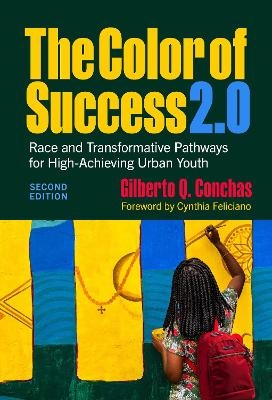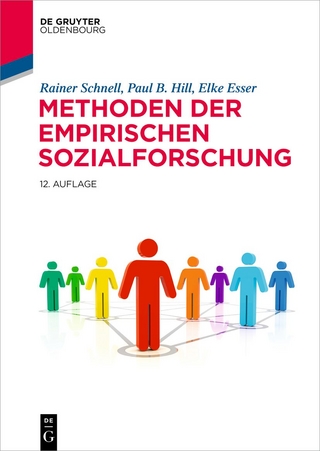
The Color of Success 2.0
Teachers' College Press (Verlag)
978-0-8077-6991-1 (ISBN)
Book Features:
Takes a rare look at Black, Latinx, and Vietnamese urban school success stories, instead of those depicting failure.
Includes narratives and perspectives of students’ daily struggles, affirmations, and successes in their quest to navigate school and beyond.
Uses mixed-methods research to respond to the challenges of a new post-pandemic political reality of racial unrest and an unequal social landscape.
Examines the role of educational leaders’ responsibility as change agents to provide equitable and dynamic pathways for success.
Gilberto Q. Conchas is the Wayne K. and Anita Woolfolk Hoy Endowed Chair of Education at The Pennsylvania State University. His books include Race Frames in Education: Structuring Inequality and Opportunity in a Changing Society, coedited with Sophia Rodriguez.
Contents
Foreword to the 1st Edition vii
Foreword to the 2nd Edition xi
Preface xv
Acknowledgments xix
Introduction: Race and Transformative Pathways to High-Achieving Urban Youth 1
The OG: The Color of Success 2
The Color of Success 2.0: New Research, Emerging Research, and Praxis 3
Minimizing Inequity and Promoting Opportunity 5
Semantic Conventions 6
Case Study Research Approach and Design 7
On My Subjectivity as a Chicana/o/x Researcher 11
Organization of this Book 14
1. A Critical Perspective of the Challenges Confronting Students of Color: Toward a Conceptual Framework of Transformative Urban School Pathways 18
Issues Associated With Educational Inequity 19
Cultural-Ecological Explanations of Low Academic Performance Among Racially Minoritized Students 21
Complicating the Cultural Ecological Framework 24
School Processes and Engagement Among Students of Color 25
The Student Voice of High-Achieving Minoritized Youth 27
Confronting Segregation and Stereotypes 28
Valuing Minoritized Students’ Experiences to Promote Urban School Success 30
Conclusion 30
2. Balkanization in Urban School Spaces: Integrated and Segregated Organizational Cultures and Structures Side-by-Side 32
Racial Segregation, Engagement, and Performance 33
Baldwin High School as the Case Study Setting 33
Why a California High School? 35
The General School Climate as Perceived by Teachers and Students 36
Non-Belonging Student Perceptions of the General School Pathway 38
The College and Career Academies 41
Mediating Distinct Peer Relations 50
Conclusion 51
3. “We Just Make the Best of What We Have”: Immigrant and U.S-Born Vietnamese American Youth Surfing the “Model Minority” Wave of Success 52
Background on Asian American Student Achievement 53
Vietnamese Origin Students at Baldwin High School 56
Gender and the Construction of Student Ability 58
Academic Identity Groups among High-Achieving Vietnamese Students 59
Understanding the “Model Minority” Stereotype 59
Structuring Competition Versus Collaborative Learning 61
Benefiting from the “Model Minority” Typology 62
Conclusion 64
4. “I Want to Make a Difference”: Understanding Immigrant and U.S.- Born Latina/o/x Students’ Variability in Academic Aspirations, School Engagement, and Optimism 66
Background on Latina/o/x School Achievement 67
School Opportunity Structure and Racial Perceptions 68
Identity Formation Among Latina/o/x Students 70
Responses of High-Achieving Latina/o/x Students 71
Creating Optimism Despite Inequity Among Medical Academy Latina/o/xs 77
Conclusion 79
5. “Nothing Can Stop Me Now”: Constructing Black Student Aspirations, Expectations, and School Success 81
Background on Black Student Achievement 81
The Situation at Baldwin High School 84
The Academy Experience at Baldwin High School 88
A Closer Look at Black Males, Aspirations, and Expectations 93
A Closer Look at Black Females, Aspirations, and Expectations 96
Conclusion 98
6. “(Obama) Becomin’ President Kinda Raise the Bar on What You’re Doin’ ”: Perceptions of Opportunity and Constraining Aspirations Among Black Male Youth During a Time of Historic Change 101
Oppositional Culture as Institutional Phenomenon 103
Historical Significance of the Election of Barack Obama 104
Promoting Academic Achievement for Students of Color 105
The Palmview Male Cooperative 107
PMC Students on Social Mobility, Racial Inequality, and Marginalization 109
The PMC as a Source of Social Capital, Cultural Capital, and Brotherhood 114
The PMC and Academic Achievement 122
Conflicting and Constraining Student Perspectives on Aspirations 123
How Can We Explain This Perplexing Phenomenon? 126
Conclusion 129
7. Institutional Change Agents: Student-Centered Approaches, Culture Shifts, and the Construction of Pathways for Urban School Success 131
College and Career Academies as Small Learning Communities 134
Unraveling School Success’s Approach to Providing TA 136
Overview of School Success 137
School Success and Technical Assistance 137
Why and How School Success Promotes the Four Pillars of Linked Learning 141
Discussion of School Success’s Current State and Future in the School Change Landscape 149
Conclusion 153
8. “We Are Like a Family . . . We Know Each Other Well and Get Along”: Teacher and Peer Relationships as (Pre)conditions for the Potential Realization of Social Capital 155
Preconditions for the Realization of Social Capital 157
Time Students Spend on Homework Outside of School 160
A Novel Approach for Examining Familial and School Preconditions for Social Capital 160
Findings From the Data in Five Steps 166
Conclusion 177
9. Racial Inequity and Transformative Educational Pathways Informing Policy and Praxis: Wrapping It all Up 180
Institutional Processes, Social Support Systems, and School Success 181
Student Ideology, Institutional Mechanisms, and Social Support Systems 182
Summary of the Key Findings and Policy Recommendations 186
Implications for Further Research 190
Policy and Praxis Limitations 191
Conclusion 193
References 195
Index 213
About the Author 220
| Erscheinungsdatum | 22.08.2024 |
|---|---|
| Vorwort | Cynthia Feliciano |
| Verlagsort | New York |
| Sprache | englisch |
| Maße | 162 x 235 mm |
| Gewicht | 476 g |
| Themenwelt | Sozialwissenschaften ► Ethnologie |
| Sozialwissenschaften ► Pädagogik | |
| Sozialwissenschaften ► Soziologie ► Empirische Sozialforschung | |
| ISBN-10 | 0-8077-6991-6 / 0807769916 |
| ISBN-13 | 978-0-8077-6991-1 / 9780807769911 |
| Zustand | Neuware |
| Haben Sie eine Frage zum Produkt? |
aus dem Bereich


